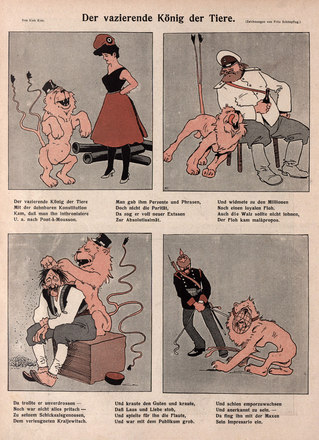-
Story The Czechs
The Lack of Alternatives: the Attitude of the Czechs towards the Habsburg Monarchy at the Outbreak of the War
The empire of the Habsburgs was seen by widespread circles of Czech political élites as Völkerkerker, the prison of nations, which hindered the process of becoming a nation. The Czechs compared themselves to a canary in a golden cage: well protected and fed, he can twitter his songs – but not fly free.
„Červený šátečku, kolem se toč, my jdeme na Rusa, nevíme proč!“
(“Little red handkerchief, wave through the sky, we fight the Russians and we don’t know why!”)
This Czech soldier’s song from the time of the First World War illustrates the divided attitude of the Czechs towards the military aims of the Habsburg Monarchy.
Nevertheless the Czechs were well aware that there were no alternatives, since the continued national existence of the Czech nation within the framework of the Habsburg Monarchy was seen as the only option. The broad mass of the Czechs were therefore not exactly wildly in love with Austria-Hungary, but were more or less loyal to the monarchy.
By the outbreak of the war in 1914, the Czech political scene was permeated by profound frustration after its past failures in achieving autonomy within the Monarchy. Hence the Czech’s enthusiasm for war was tepid, although the recruitment ordered by the authorities was obeyed. There were no serious incidents, as originally feared by the military command, who were convinced of lack of loyalty among the Czechs.
Nevertheless, war euphoria was distinctly more muted than among the German citizens of the country. The concept of an enemy embodied in the Serbs did not function among the Czech public, since they showed sympathy towards the “Slavic brother” confonting the giant Austria as had David against Goliath.
And the populace along the Vitava did not see Russia as the great enemy either. However, there were no major protest actions or Pan-Slavic agitations, although Russia’s initial successes on the Galician battlefield sparked off a number of pro-Russian demonstrations – which were immediately silenced by the state authorities. Pan-Slavism, that great ogre of German nationals, remained a minority programme in the mainstream of Czech society.
Vienna invited the leading political representatives of the nationalities under Habsburg rule to “close ranks with one national ideal”. The Czech Federation (Český svaz) was founded in November 1916 with this in mind; it was a reservoir of the Czech members in the Imperial Council as representation of the nation.
Because of the state of war, the opportunities of Czech politics to continue pursuit of their democratic endeavours and the reinforcement of federalist trends was strongly restricted, even foiled. They had to wait for the outcome of the war. The Czech political scene foresaw a gloomy future in case of victory for Austria-Hungary on Germany’s side. Defeatism spread, people tried to draft a minimal concept for maintaining their national existence in a German-dominated Central Europe.
The position of Czech politics was characterised by passivity. The mainstream parties behaved neutrally, the conservatives and clericals insisted stubbornly on their loyalty to the House of Habsburg. The radical-democratic and radical national representatives were persecuted and silenced by being convicted to long prison sentences, or forced into exile.
An example can be seen in the Czech Imperial Council member Karel Kramář (1860–1937). As mandatory of the Young Czechs he demanded the end of the pro-German course in Austrian politics. The alliance with Germany should be stopped and instead an approach to Russia should be aspired to. After the victory expected for Russia, he saw for his nation a state autonomy under the sceptre of the Romanovs, comparable to Hungary’s position within the Habsburg Monarchy. Kramář was arrested in May 1915, although he actually availed of parliamentary immunity. Charged with high treason, a court martial condemned him to death. But the verdict was not carried out. In 1917 Kramář was freed by Emperor Karl I in the course of a far-reaching amnesty for politically persecuted persons. Subsequently Kramář became the leading figure in the anti-Austrian camp among the opponents of the Monarchy who had still remained in the country, and was to play a leading role in the coup d’état of 1918.
Translation: Abigail Prohaska
Hoensch, Jörg K.: Geschichte Böhmens. Von der slavischen Landnahme bis ins 20. Jahrhundert, München 1987
Kořalka, Jiří/Crampton, Richard J.: Die Tschechen, in: Wandruszka, Adam/Urbanitsch, Peter (Hrsg.): Die Habsburgermonarchie 1848–1918, Band III: Die Völker des Reiches, Wien 1980, Teilband 1, 489–521
Kořalka, Jiří: Tschechen im Habsburgerreich und in Europa 1815 bis 1914. Sozialgeschichtliche Zusammenhänge der neuzeitlichen Nationsbildung und der Nationalitätenfrage in den böhmischen Ländern (Schriftenreihe des Österreichischen Ost- und Südosteuropa-Instituts 18), Wien 1991
Křen, Jan: Dvě století střední Evropy [Zwei Jahrhunderte Mitteleuropas], Praha 2005
Rauchensteiner, Manfried: Der Erste Weltkrieg und das Ende der Habsburgermonarchie 1914–1918, Wien u. a. 2013
Rumpler, Helmut: Eine Chance für Mitteleuropa. Bürgerliche Emanzipation und Staatsverfall in der Habsburgermonarchie [Österreichische Geschichte 1804–1914, hrsg. von Herwig Wolfram], Wien 2005
-
Chapters
- The Czechs in the Habsburg Monarchy
- How Czechs evolved from Bohemians
- The Revivalists of the Nation
- Separate Ways: The Effects of the 1848 Revolution in Bohemia
- The Vectors of Czech National Identity
- The Call for Autonomy
- Hardening of the Fronts: The Czech Demand for the Bohemian Compromise
- Attempts at Solutions and Escalation: Language Conflict and Badeni Crisis
- The Czechs’ Spectrum of Parties
- The Lack of Alternatives: the Attitude of the Czechs towards the Habsburg Monarchy at the Outbreak of the War


